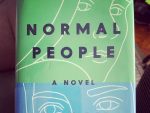In 2017, Sally Rooney released her debut novel, “Conversations with Friends,” which would go on to sell over 78,000 hardcover and paperback copies. Last month, in May 2022, BBC Three and Hulu finally dropped their highly-anticipated 12-episode adaptation of the book.
Prior to this series, Rooney’s novel “Normal People” was adapted into its own 12-episode TV series that debuted in 2020. The series told viewers a powerful love story that examined the complex relationship between the two main characters, Marianne Sheridan and Connell Waldron.
Much like the “Normal People” TV series, “Conversations with Friends” has given viewers an intimate look into the book’s characters and core themes of identity, friendship and love. The plot takes place in the present and is primarily set in the city of Dublin. It tells the story of a group of four friends going through the motions of life. “Conversations with Friends” stands out as a novel that, according to a recent Bustle article, “feels no obligation to explain things by way of naming them.”
Thanks to Sally Rooney’s reputation, “Conversations with Friends” has been highly anticipated, but it has garnered mixed reviews from audiences.
Played by Allison Oliver, the main character Frances Flynn narrates both the novel and the TV series. Frances is a quiet young woman in search of her own identity and struggling to cope with her insecurities. She previously shared a relationship with her best friend, Bobbi Connolly, who is played by Sasha Lane; the series portrays Bobbi as a normal person who appears to have it all together despite dealing with mundane familial issues.
As the series moves along, a few other characters are introduced, two of which are Nick Conway, who is played by Joe Alwyn, and Nick’s wife, Melissa Baines, who is played by Jemima Kirke. Nick’s illicit affair with Frances becomes a central theme throughout the series, as Frances finds ways to navigate other relationships while involved with a married man. Melissa, who is admired by Bobbi to a lesser extent, plays a more minor role. Her character is portrayed as an obstacle to Frances — one that she must overcome.
Ultimately, the series interprets the events of the story from Frances’ perspective — every character is framed by their relationship with her. Throughout the series, Frances navigates her affair with Nick as well as her friendships with Bobbi and Melissa. Part of the storyline vaguely touches on her strained relationship with her father, which affects her perception of certain moments; in the process, the show revisits the theme of individuality while Frances simultaneously examines her own identity.
The major difference between the “Conversations with Friends” television adaptation and the previous series, “Normal People,” lies in both shows’ faithfulness to the source material. After “Normal People” hit Hulu, fans felt extremely pleased with the love story, which stayed true to the book despite very minor inconsistencies. Many die-hard fans have made clear distinctions between the two adaptations, noting that “Conversations with Friends” did not follow the events of the novel as precisely.
This time around, fans — especially fans of Sally Rooney’s books — cannot help but feel a bit disappointed in the inconsistencies between the television version of “Conversations with Friends” and the book. Fans debate whether the series did the novel justice or if any praise at all would be too generous.
A recent Mashable article determined that “unfortunately the best part of the novel does not translate to screen.” Conversations between characters and the emotive aspects of the dialogue were not properly conveyed or entirely left out. The complexity of Frances’ character, along with the interactions she has with Bobbi and Nick, are dissimilar to the novel and create ambiguity where there should be clarity.
Many people assert that the characters of the series (and even the novel) are unbearable and pretentious. In their own way, each character tries to rationalize their choices by painting their actions in poetic or romantic terms. Other viewers feel safe with these characters and appreciate their relatability, which is apparent in the mistakes they make.
This adaptation has not been a total waste of time, and there have been a number of other fans who enjoyed the series. Those who previously read the novel had high expectations and for many, they have been satisfied by the series’s outcome. The opportunity to see Frances’ profound inner turmoil, including her emotional issues and struggles with self-harm, was intriguing. The story depicts her as someone who constantly lives through emotional pain that translates into physical pain. When the news that she might not be able to bear her own children is revealed through her endometriosis diagnosis, she experiences a whole other type of heartbreak.
Even if there have been a number of criticisms leveled at this adaptation of “Conversations with Friends,” there has also been a beauty in being able to see Frances, Bobbi, Nick and Melissa’s characters brought to life over just 12 simple episodes. Ultimately, Sally Rooney has done it again. She has managed to get another novel adapted into a TV series, leaving her fans wondering what else is in store for Rooney and the rest of her work.

















